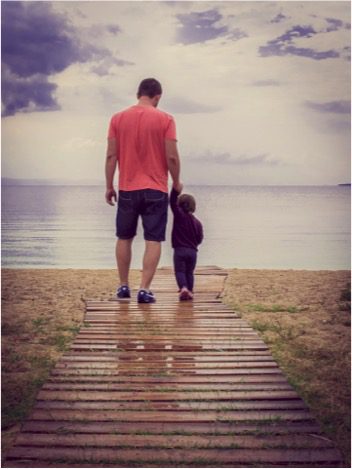Written by Matthew Rigberg, LHMC

In the first part of my fatherhood blog, I shared some of the experiences I had when I was presented with the gift of fatherhood. It wasn’t always easy, but by identifying my personal strengths and engaging my challenges, I was able to prioritize my role in my family’s system. If parenthood is in your horizon, it’s important to consider the transformation of the modern-age father. I’ll help you understand it with the following pieces of valuable information.
The Modern Father
It’s important to consider the transformation of the modern-age father. Click To TweetResearchers are publishing data that is demonstrating the evolution of the modern father. This is partly attributed to the increased discussion of gender roles and the shift from single-income to dual-income families. Working mothers have become a stronghold of our society and current economy, but according to U.S. Census Bureau data, stay-at-home fathers exist in only 1% of married couples with kids under age 15.
In the last 40 years, “Women have said, ‘Wait a minute, we are competent and assertive and ambitious,’” claiming a wider range of roles, said Michael Kimmel, executive director of the Center for the Study of Men and Masculinities at Stony Brook University. Yet, Kimmel additionally revealed, “Men have not said, ‘We’re kind, gentle, compassionate and nurturing.’”
Times Are Changing
In today's age, being a good father requires more than earning a paycheck. Click To Tweet We are pushing up against deeply rooted beliefs about men and, perhaps, about perceived value versus actual value. In fact, in a recent online survey by advertising agency DDB Worldwide, nearly three quarters of Americans surveyed said stay-at-home dads were just as good at parenting as stay-at-home moms.
We are pushing up against deeply rooted beliefs about men and, perhaps, about perceived value versus actual value. In fact, in a recent online survey by advertising agency DDB Worldwide, nearly three quarters of Americans surveyed said stay-at-home dads were just as good at parenting as stay-at-home moms.
We are on the precipice of a new ideal: being a good father requires more than earning a paycheck. Fathers today are expected to be involved in child care, domestic responsibilities and sharing work at home with their partners rather than simply helping out when needed. A survey of largely professional fathers from Boston College’s Center for Work and Family found that they valued their role in caring for their children.
They also found that fathers who placed a higher value on their caregiving roles also reported spending more time caregiving on a workday, and further, fathers who see their children daily report higher job satisfaction and are less likely to resign.
In 1965, fathers spent 4.4 hours per week on housework and 2.5 hours per week on child care. In 2008, fathers reported spending 9.5 hours per week on housework and 7.8 hours per week on child care.
A Positive Shift
Loving, caring behavior modeled by men helps children establish healthy relationships. Click To TweetThe shift in ideology is clear and significant. In addition to alleviating the childrearing responsibilities that have historically fallen on the mother, research shows us the notable impact that active fatherhood has on children:
- Anne VanderMey writes that children form a sense of pride towards their fathers who model these changing/evolving gender roles.
- A father brings unique contributions to the job of parenting a child that no one else can replicate, particularly of children’s openness to the world.
- An affectionate, supportive and involved father can greatly contribute to a child’s cognitive, language and social development, as well as academic achievement, a sense of well-being, healthy self-esteem and authenticity. (Link)
- Loving, caring behavior modeled by men helps children establish healthy expectations for future relationships.
- Girls who have a positive relationship with their father tend to do better in math and boys who have an actively involved father tend to have better grades and perform better on achievement tests. (Link)
- Children tend to have less behavioral problems and are somewhat inoculated against alcohol and drug use.
- Research indicates that fathers are equally important as mothers in their respective roles as parents, protectors, financial supporters and, most importantly, models for social and emotional behavior.
- Through play and encouraging risk, fathers have a unique role in teaching their children how to handle their bodies and emotions and are more likely to encourage their children to take risks, embrace challenges and be independent. (Link)
- Fathers who are engaged can better monitor their children’s activity as well as the peers and adults in their children’s lives. (Link)
- Rob Palkovitz, professor of Human Development and Family Studies at the University of Delaware, reports that paternal absence has been cited by multiple scholars as the single greatest risk factor in teen pregnancy for girls.
The following charts prove compelling evidence into the importance of engaged fathers (Link can be found here):


Take on the Challenge
Engaged parenting is flexible and subjective. It takes on many forms and there is no “right” way to parent. We do know, though, how important engaged parenting is to the development of thriving, well-adjusted children and the maintenance of a healthy partnership.
So I challenge you to ask yourself, what type of parent are you? What type of parent do you aspire to be? How would you like to get there?

